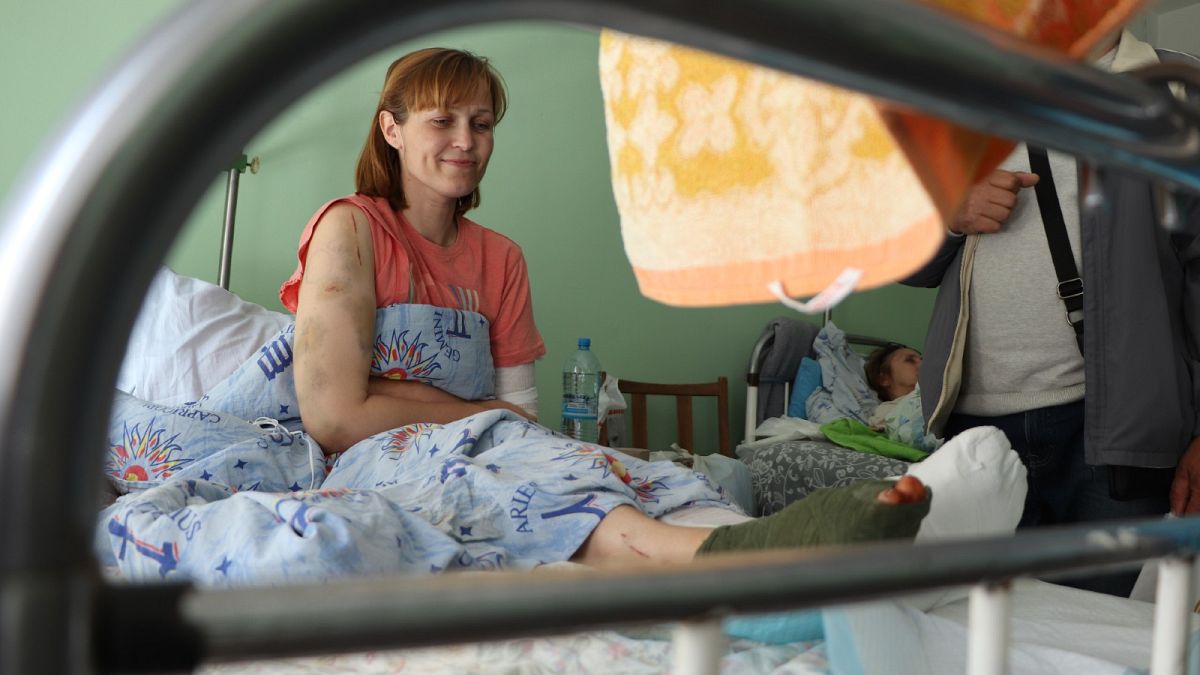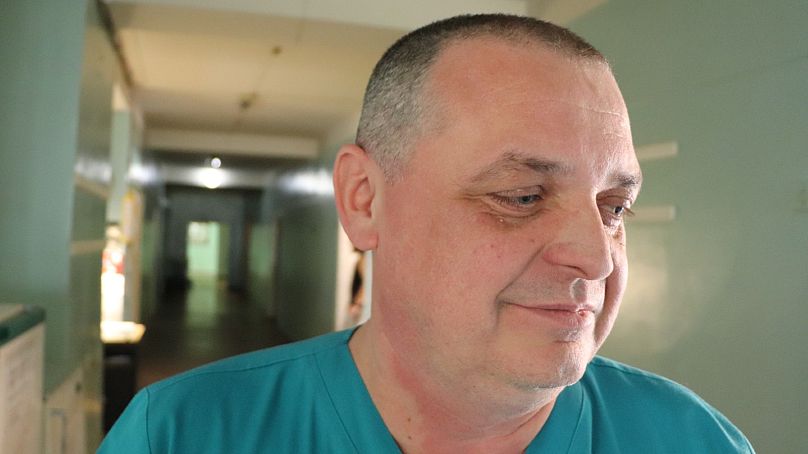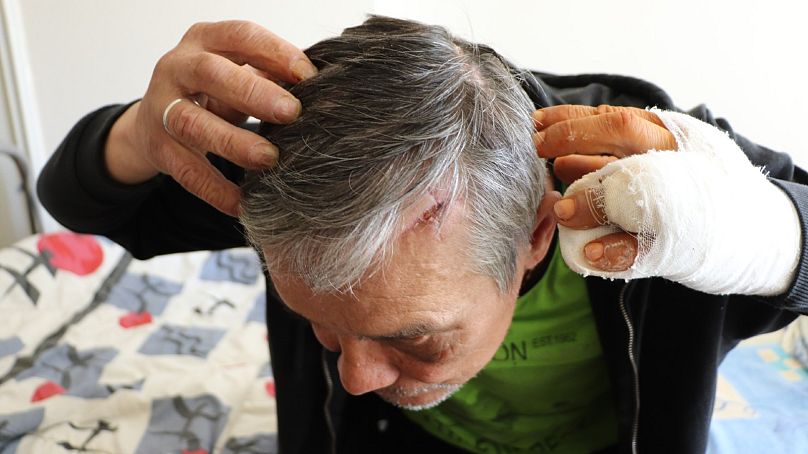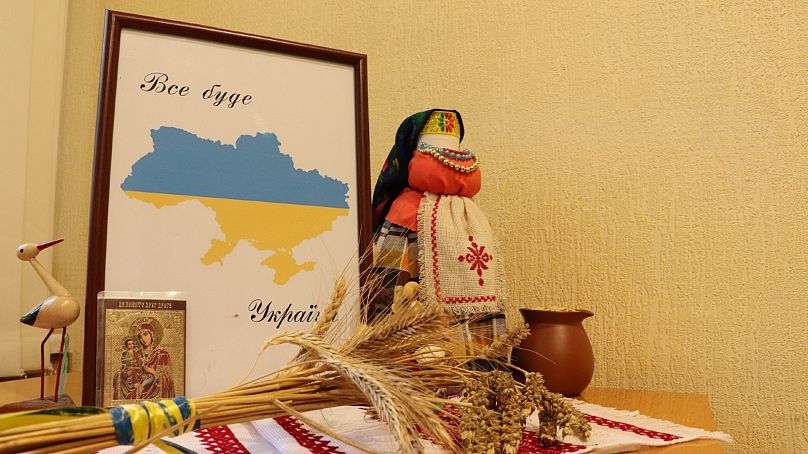The injured are sometimes the forgotten victims of war. Euronews visited a hospital in Ukraine to meet some of them.
Natalia's first instinct after a bomb destroyed much of her house was to locate her five-year-old daughter.
After finding her amid the rubble, she raced with the youngster in her arms to soldiers near the frontline in south-east Ukraine.
They applied a tourniquet to her leg, but it wasn't enough to save it. She remains in intensive care at a hospital in Kryvyi Rih, around 50 kilometres from the fighting.
Her mum is in a nearby hospital, feeling lucky to be alive after the bomb -- which fell in late April -- failed to detonate. She lost her toe, has damaged feet and is bruised black and blue.
“It came through our roof, and all the rubble fell all over us," said Natalia, adding her family had not been sheltering underground as there was no siren in their village of Vysokopilla.
"My five-year-old daughter is at another hospital here in Kryvyi Rih. She lost her leg. I just remember how everything fell on me. I am petrified today. I feel terrible. My daughter is still in urgent care. I just hope that all of this will be over.”
The pressure on the hospitals
Natalia is one of many patients at the hospital in Kryvyi Rih, which receives some of the worst cases in the region. Often wounded civilians firstly arrive at hospitals near the frontline and are then moved to bigger ones such as this if their injuries require it.
The UN’s official civilian death toll in Ukraine is 3,381, but the actual number might be much higher, according to Matilda Bogner, head of the UN mission in Ukraine. She says 3,680 people have been injured.
On top of this is the military casualties. Ukraine says more than 25,000 Russian soldiers have died, while last month Volodymyr Zelenskyy said last month that up to 3,000 Ukrainian troops have been killed. Euronews is unable to independently verify either claim.
“We heard about snipers on roofs who would just shoot fairly randomly at civilians when they would cross the road, I assume as a form of trying to keep people in their houses and discourage them from going out,” said Bogner.
Back at the hospital in Kryvyi Rih - whose walls are worn down and windows blocked by blankets to stop the building from becoming a target, the head of the polytrauma department Yuri Pashkov makes his morning rounds.
He tells Euronews that more and more patients are arriving every day. Much depends on the intensity of the nearby fighting, which has seen the Ukrainian army try and push back Russian troops towards Crimea, which Moscow annexed from Kyiv in 2014.
“The situation now is more stable than it was in the first part of the war,” he said. “We have everything that we need to take care of the situation for now.”
The arrival of military doctors to the hospitals near the frontline has helped dramatically. They provide vital first aid before the patients arrive at the hospital in Kryvyi Rih, making their job easier. Fragments from artillery fire wound many patients here, he said. The small pieces of metal are penetrating the body and damaging everything.
'He hit me with his assault rifle'
Olexander, 57, who has been in Kryvyi Rih hospital for more than a month, is eager to show Euronews his wounds.
He claims a Russian soldier hit him on the head with a rifle after Olexander tried to stop him from stealing food.
It happened in Vysokopillia, a Russian-held village, meaning Olexander had to cross into Ukrainian-controlled territory to get treatment.
“I was knocked out and woke up all in blood. I had to cross the border by foot,” said Olexander, who has a long scar on his scalp.
“The Russians were often getting drunk and just went into people's houses, looking for food, vodka and valuables.
“I just got mad, so I wanted to stop it. That might have been stupid, but I couldn’t stop myself.”
Olexander, who also suffered two broken ribs and an injured hand, says he's on the road to recovery and hopes to be released soon.
But, he adds: “I will never be able to forgive this."
Injured soldier: 'My friends are out there, I need to be with them'
There are also wounded soldiers at the hospital.
Euronews is not allowed to take photos of their faces or use their full names but is allowed to see them being treated.
One is a sniper wounded by an artillery fragment - it went through his right thigh and left an open hole. It is still uncertain whether he will recover without any permanent injury.
Another soldier, Anton, agrees to speak. He says he was wounded a few weeks ago when artillery hit his position as he was relocating.
It exploded just 15 metres from him, and a large fragment went through his back. Miraculously, he isn’t paralysed and is already able to walk with crutches. However, he has a big hole in his back and says it isn’t healing, causing significant problems.
“When I am better, I will go back out and fight,” says Anton, “My friends are out there. I need to be with them. I am not afraid of going back. I know what I am getting into.”
Asked whether he thinks there will ever be peace, he says it has to come. What it will look like, he doesn’t know, but it will be hard ever to forgive Russia.
“I will never be able to forgive. But, maybe the future generations will,” he said.



